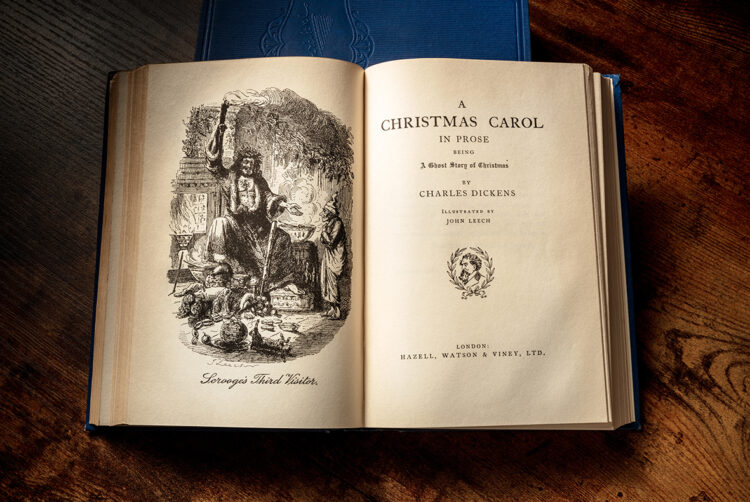Marketers could learn some lessons in virtue signalling from Charles Dickens

Opinion
Enough with meaningless, impersonal marketing messages during the festive period.
It has become common practice to send Christmas messages via email rather than a paper card. But this year it struck me that it has become a particularly soulless part of people’s marketing activities.
Long gone is any attempt at wit, humour or relevance and instead a somewhat impersonal message of seasonal good wishes, often accompanied by a promotional message, almost deliberately designed to have minimal meaningful impact on any cause or the life of the person sending it.
The ones that bother me most are the rather pious “instead of sending you a card, we have donated to X or Y charity” ones — carefully avoiding letting you know how much they have donated or why they have chosen that charity. I would like to know. It would actually allow me to share in the pleasure if I knew that £100, £500 or even more had been donated. Instead, I find myself thinking, rather uncharitably perhaps: “I bet you haven’t or it’s such a paltry amount that you don’t want to tell us.”
Am I alone in wondering about this rather unsatisfying form of value substitution?
An opportunity for creativity
If companies and individuals knew they were going to tell us how much, they would be more generous. It would certainly mean more thought would be given to the formula used to calculate the amount. Do people multiply their mailing list by the 75p cost of a second-class stamp? Or is there another amount that they think stands up to scrutiny as “generous” given their relative wealth?
One email I received listed no fewer than six charities they claimed to be supporting. I doubt each charity got very much (although we all know every £1 helps), but I wondered if supporting six made the sender feel more generous or whether it was intended to find at least one charity the receiver would be pleased to see supported.
The market in cards is still worth £1bn. Many companies used to get a Christmas card specially designed and printed, so the unit cost must have been considerably more than the current average of 40p. For many agencies, it gives the opportunity to show off their unfettered creativity. I hope they still do that and at least there would be relevance in demonstrating some creativity and wit at a busy time of year. I always appreciated getting physical cards scrupulously signed by the team working on my business. It demonstrated care and effort, and the cards added a bit of festive cheer to the corporate office.
Dickens points us in the right direction
Driving to spend Christmas day with my sister in the countryside this year, my family listened on Audible to the Charles Dickens classic A Christmas Carol, beautifully read by Hugh Grant. It had never sounded more relevant. At the beginning of the story, Ebenezer Scrooge declines to donate to charity, refuses an invitation to join his nephew Fred for Christmas dinner and can barely bring himself to give his underpaid employee Bob Cratchit the day off. A man completely devoid of compassion or generosity.
As we know, having been visited by the three spirits of Christmas, Scrooge comes to regret his selfishness and greed, and commits to change his ways. He awakes on Christmas morning and makes a large donation to the charity he rejected the previous day, arranges for a large turkey to be delivered to the Cratchit home and joins Fred’s party. The following day, he gives Cratchit an increase in pay.
Thomas Malthus was a political economist at the time Dickens wrote his novella, most famous for his subsequently discredited view that the supply of food cannot keep up with the growth of human population, leading inevitably to war, famine and deprivation. He was strongly critical of the Poor Law of 1834 that, by offering the poor relief and introducing the development of workhouses, undermined independent workers in his view.
The idea of helping the poor and increasing the wages of the working class put forward by Dickens, who was motivated to draw attention to the ever-increasing wage gap between the upper and lower classes in the Hungry Forties, lay in sharp contrast.
Dickens’ target audience was the middle classes, who had the wealth and political clout to ensure workers were paid properly, child labour was outlawed and people were not demonised for being poor. Through his storytelling, we see that the Cratchits are a loving family who work hard but whose circumstances are victim to the wages on offer.
We can also recognise the effortless joy and sense of belonging Mr Fezziwig brings to his workplace when he closes the shutters and encourages his employees to enjoy a Christmas party. What a contrast to the “sobriety marshals” at London law firms in 2023, charged with ensuring staff don’t drink more than a couple of glasses of wine at the Christmas party. Or employers who barely provide enough budget for a trip to McDonald’s.
It’s possible for brands to do it well
A few big brands have tried to make their Christmas message more meaningful by firmly attaching themselves to a cause. In 2022, Waitrose donated £100,000 from sales of its Christmas chocolate yule log. At John Lewis, proceeds from its cuddly Lewis bears were split between Action for Children (50%), Home-Start UK (30%) and Who Cares? Scotland (20%). This year, Co-op resolved to forgo a traditional Christmas TV ad and instead asked members and customers to donate to local community groups, with the organisation matching to the tune of £1m.
And, of course, many charities run Christmas appeals as they try to benefit from the season of giving. Shelter estimates that over 131,000 children in England will have woken up on Christmas day in temporary accommodation an increase of over 10,000 since 2022 and a record high. At the heart of its striking 2023 campaign is a 90-second film entitled “Good as Gold”, which follows Maddy, who tries to be “good as gold” in the hope of being rewarded with the one thing she wants most for Christmas: a home. But the end poignantly reveals that Maddy wakes on Christmas morning to find herself stuck in temporary accommodation.
Even in secular terms, we have come to understand the “spirit of Christmas” in the Western world as one of compassion and generosity. My hope for 2024 is that everyone reconsiders what that actually means in the context of a Britain where an estimated 14.5 million people – 22% of the population — are living in poverty. Of these, 4.3 million are children. No doubt we could all do a bit better with our Christmas compassion and generosity in 2024 and stop sending empty e-marketing messages.
 Jan Gooding is one of the UK’s best-known brand marketers, having worked with Aviva, BT, British Gas, Diageo and Unilever. She is now an executive coach, chair of PAMCo and Given. She writes for The Media Leader each month.
Jan Gooding is one of the UK’s best-known brand marketers, having worked with Aviva, BT, British Gas, Diageo and Unilever. She is now an executive coach, chair of PAMCo and Given. She writes for The Media Leader each month.



